Thomas Pluck's Blog, page 62
May 15, 2012
Demand Respect (Writing Horror Story)
Before we begin, no matter how long you've been writing, hie thee to these two excellent resources for vetting publishers, editors, agents and other professionals:
Writer Beware
The Absolute Write Water Cooler
I came across this horror story on Facebook, shared by F. Paul Wilson.
The short version:
Writer submits to an anthology, signs contract, never receives her comp copy; a friend mails her a copy at considerable expense, and she finds her title has been changed with a typographical error to "She Make's Me Smile," and a superfluous scene of animal abuse, a suggestion of rape, and other edits have been made without her approval. She writes to the editor, saying in polite terms, "What the hell?"
Her questions, paraphrased (If this was me, it would make Chuck Wendig's colorful vulgarian exclamations seem tepid):
The publisher's response:
Now, writers can be a touchy lot. We are very eager to see our work in print. Not everyone responds to edits in a professional manner, but you do NOT make edits without approval unless they are correcting typographical errors, streamlining usage to the publisher's stylebook, or other minor changes. And you do not write your own paragraph to insert into someone's story and call it an edit. It is not an edit, it is a collaboration. Or in this case, a defacement.
This is the added paragraph. If you read Ms. DeGeit's post, you will notice that she intentionally made her character gender neutral; the editor made him male, and sexually aroused by an animal getting beaten. This isn't a "this line is awkward, can you reword this?" or a "Can you give us a little background as to why this character beats his dog?" It's "I've decided your character is male, and to give him this backstory."
Ugh. For one, this is just awful writing, and awful characterization. If you want someone to be erotically aroused by animal abuse, it does not happen from seeing your neighbor do it once. May I recommend this fine article, if you want to incorporate this sort of life-changing event in a disturbed character's life: Frenzy, at Alice Miller's site.) But it doesn't matter if it was brilliant; this is not Mrs. DeGeit's work. This isn't an edit, it is an insertion, without approval. The lack of professionalism in his response is galling. Pluck smash!!
Now, I've had edits I don't like. I had one editor cut the first five paragraphs of a story. It was one of my first publications, of a very profane and silly story about four metalhead stoners who become the horsemen of the apocalypse. I hastily signed the contract, didn't see the attachment, and missed the edits. And I did complain upon publication, and the editor pointed me to the previous email, and he was right. I didn't complain publicly, because they did not rewrite my work, they trimmed it. I promoted the story to my readers without grumpiness, and I submitted the "unexpurgated" version to another zine, which accepted it without edits, and even had their artist make a nifty illustration:
Not with a Bang, but a Squeaker, at Schlock Magazine.
No matter how excited you are to be published, remember:
Yog's Law: Money Flows TOWARD the Writer.
There is no publishing without the writer. The writer must whip themselves into shape, and the writer's every word is not always honey, and the writer does need to learn to edit- but have some self-respect. Mandy DeGeit is perfectly in her rights in this, minus the fact that the contract was vague and she assumed she was dealing with professionals. Don't let publishers treat you like shit. Like accepting bad treatment in any relationship, it becomes a habit.
And this is not to excoriate editors. I know plenty, and I appreciate their hard work. It is no picnic.
I am an editor, for the Lost Children anthologies. I respect the writer's work. I've corrected authors with a dozen excellent novels under their belts, writers I idolize. We all make typos and mistakes.
And I've had to ask for rewrites from fine writers who I consider friends. You need to be tough, to respect the reader as well as the work. But I didn't write a damn word of the rewrites. I made suggestions, and one writer went so far as to change the ending in a way that really made the story stronger than I imagined it could ever be. I don't consider myself a great editor. I get gut feelings with a story, that I visualize as "holes" in the world it creates inside my head. I try to explain how to fill that hole. I don't get the can of spackle and fix it myself.
So, vet who you submit to. READ the magazines you submit to. For one, this saves time on rejections because your story isn't a good fit. Secondly, you see the level of professionalism. Do they accept just anything? Does it look more like your little cousin's Facebook status than a well-edited publication? Do the same writers keep showing up, issue after issue, a circle jerk of buddies who might deign to let you into their club if you kiss enough pimply ass? This is beyond the ripoff artists who charge "reading fees," who mention payment but never pay, who accept your work and sit on it without a contract, and so on. The one editor who taught me the most about being a pro is Alec Cizak, formerly of All Due Respect, now editing Pulp Modern. He had serious edits for a story, but went about it professionally. He mailed two copies of a contract. He published on time, he sent payment promptly, and he made my story look damn good.
He's an ideal publisher; there are plenty more. Your work deserves that kind of treatment. If you don't believe that, than why are you sending it out? If it's not good enough to deserve respect, rewrite the damn thing or throw it out.
~ the Plucker
© 2012 Thomas Pluck
I post on Twitter as TommySalami ~ My Facebook Page

Writer Beware
The Absolute Write Water Cooler
I came across this horror story on Facebook, shared by F. Paul Wilson.
The short version:
Writer submits to an anthology, signs contract, never receives her comp copy; a friend mails her a copy at considerable expense, and she finds her title has been changed with a typographical error to "She Make's Me Smile," and a superfluous scene of animal abuse, a suggestion of rape, and other edits have been made without her approval. She writes to the editor, saying in polite terms, "What the hell?"
Her questions, paraphrased (If this was me, it would make Chuck Wendig's colorful vulgarian exclamations seem tepid):
1- Why there was a mistake in the title
2- Why my bio was shortened? There were much longer ones (like his own) so it wasn’t for space issues.
3- Why the story was changed?
The publisher's response:
lets see. on the contract, it clearly says publisher has the right to EDIT work. you signed it. are you saying you are a dishonest and immoral person and will now try to deny you signed the contract? well i have a copy right here and as for the story. the editor had a hard time with it, it was very rough and he did alot to make it readable. despite what you think, your writing has a long way to go before its worthy of being printed professionally. we did what we had to do to make the story printable. you should be thankful, not complaining. ah, the ungrateful writer, gotta love it
Now, writers can be a touchy lot. We are very eager to see our work in print. Not everyone responds to edits in a professional manner, but you do NOT make edits without approval unless they are correcting typographical errors, streamlining usage to the publisher's stylebook, or other minor changes. And you do not write your own paragraph to insert into someone's story and call it an edit. It is not an edit, it is a collaboration. Or in this case, a defacement.
This is the added paragraph. If you read Ms. DeGeit's post, you will notice that she intentionally made her character gender neutral; the editor made him male, and sexually aroused by an animal getting beaten. This isn't a "this line is awkward, can you reword this?" or a "Can you give us a little background as to why this character beats his dog?" It's "I've decided your character is male, and to give him this backstory."
“Something strange happened then. I recalled a moment when I was a boy. I was playing in my backyard when the dog in my neighbor’s yard escaped through an open gate. My neighbor, an elderly man who lived alone and spoke in a thick accent (I later discovered that is was German), managed to corral the dog back into his yard. I watched, fascinated as the man ripped his long black belt from the loops at his waist and brought it down with a hellish fury upon the dog’s back. The dog slunk down and rested it’s head upon its paws, resigned to its fate. Why didn’t it fight back? Why didn’t it bite the hand of the master?
With the only friend I ever truly had writhing between my legs, I became aroused.”
Ugh. For one, this is just awful writing, and awful characterization. If you want someone to be erotically aroused by animal abuse, it does not happen from seeing your neighbor do it once. May I recommend this fine article, if you want to incorporate this sort of life-changing event in a disturbed character's life: Frenzy, at Alice Miller's site.) But it doesn't matter if it was brilliant; this is not Mrs. DeGeit's work. This isn't an edit, it is an insertion, without approval. The lack of professionalism in his response is galling. Pluck smash!!
Now, I've had edits I don't like. I had one editor cut the first five paragraphs of a story. It was one of my first publications, of a very profane and silly story about four metalhead stoners who become the horsemen of the apocalypse. I hastily signed the contract, didn't see the attachment, and missed the edits. And I did complain upon publication, and the editor pointed me to the previous email, and he was right. I didn't complain publicly, because they did not rewrite my work, they trimmed it. I promoted the story to my readers without grumpiness, and I submitted the "unexpurgated" version to another zine, which accepted it without edits, and even had their artist make a nifty illustration:
Not with a Bang, but a Squeaker, at Schlock Magazine.
No matter how excited you are to be published, remember:
Yog's Law: Money Flows TOWARD the Writer.
There is no publishing without the writer. The writer must whip themselves into shape, and the writer's every word is not always honey, and the writer does need to learn to edit- but have some self-respect. Mandy DeGeit is perfectly in her rights in this, minus the fact that the contract was vague and she assumed she was dealing with professionals. Don't let publishers treat you like shit. Like accepting bad treatment in any relationship, it becomes a habit.
And this is not to excoriate editors. I know plenty, and I appreciate their hard work. It is no picnic.
I am an editor, for the Lost Children anthologies. I respect the writer's work. I've corrected authors with a dozen excellent novels under their belts, writers I idolize. We all make typos and mistakes.
And I've had to ask for rewrites from fine writers who I consider friends. You need to be tough, to respect the reader as well as the work. But I didn't write a damn word of the rewrites. I made suggestions, and one writer went so far as to change the ending in a way that really made the story stronger than I imagined it could ever be. I don't consider myself a great editor. I get gut feelings with a story, that I visualize as "holes" in the world it creates inside my head. I try to explain how to fill that hole. I don't get the can of spackle and fix it myself.
So, vet who you submit to. READ the magazines you submit to. For one, this saves time on rejections because your story isn't a good fit. Secondly, you see the level of professionalism. Do they accept just anything? Does it look more like your little cousin's Facebook status than a well-edited publication? Do the same writers keep showing up, issue after issue, a circle jerk of buddies who might deign to let you into their club if you kiss enough pimply ass? This is beyond the ripoff artists who charge "reading fees," who mention payment but never pay, who accept your work and sit on it without a contract, and so on. The one editor who taught me the most about being a pro is Alec Cizak, formerly of All Due Respect, now editing Pulp Modern. He had serious edits for a story, but went about it professionally. He mailed two copies of a contract. He published on time, he sent payment promptly, and he made my story look damn good.
He's an ideal publisher; there are plenty more. Your work deserves that kind of treatment. If you don't believe that, than why are you sending it out? If it's not good enough to deserve respect, rewrite the damn thing or throw it out.
~ the Plucker
© 2012 Thomas Pluck
I post on Twitter as TommySalami ~ My Facebook Page

Published on May 15, 2012 06:23
May 11, 2012
Screaming for Avengers: Two Confessions
I have a confession to make.
I never read comic books as a kid.
The earliest I remember was picking up an issue of Star Brand for 35 cents in junior high, trying to get into it, and failing. I always liked the Hulk, but that was from the TV show. Same with the Superman movies, and the Batman TV show. I came into it second hand. I've enjoyed many comics and graphic novels since, from The Dark Knight Returns, to the first Marshal Law books, to Kurt Busiek's excellent Astro City, which remains my favorite superhero series. And if you don't like superheroes, his standalone "The Tarnished Angel" is a great noir story.
But as someone who didn't grow up with comics, or love them wholeheartedly later, I have some unpopular opinions. I think Zak Snyder's ending to Watchmen was an improvement. I like Ang Lee's Hulk movie better than the Ed Norton one. I find the X-Men annoying, because the mutie as race minority allegory is patronizing and doesn't make sense when mutants can zap you to dust by forgetting to wear their sunglasses. We have reason to fear them. But that's an argument for another day, maybe when the Wolverine movie comes out.
I was not sold on Marvel's lead-ups to the Avengers. Iron Man, I loved that movie. The rest were all flawed in some way. Captain America probably the least, but it needed more action and less montage. And he should have
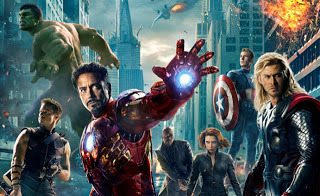
I was worried about the Avengers when the opening and villain introduction were rather tepid. Nick Fury and SHIELD were not sufficiently bad-ass. That is rectified by the end of the movie, thank goodness. My review will be short and sweet. Every character shines in this one. Much has been said of the fantastic interplay of the heroes, and that is a great strength. But even alone, they are the best incarnation on-screen, even Stark as Iron Man. Let's face it, they all have issues and spending time with any of these guys gets tiresome. It's a testament to Robert Downey Jr.'s characterization that we don't want Rhodey to drop a deuce in every one of Stark's suits by the end of an Iron Man movie. And that's fine, he should be a flawed man.
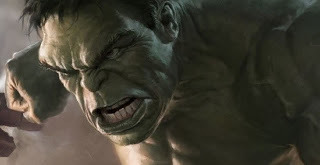
But in the Avengers, they can be more annoying than ever, because the doses are smaller. Cap can be an out of touch goody-good. Banner can be aloof, condescending and always have "You won't like me when I'm angry" unspoken, on the tip of his tongue, a passive-aggressive bully. Thor's elevated speech and godliness can be more than a joke. The best scene is likely when the gang is all arguing due to trickster god Loki's manipulations, aboard SHIELD's hovercraft air carrier. And that includes the Hulk going apeshit, which should be my favorite scene.
Well played, Whedon. That's confession two. Despite being a Firefly fan, I've always been very critical of Joss Whedon's writing. It's very good, but there was always fan service, which rubs me the wrong way. I find it condescending, especially when superhero movies have been blockbusters for a decade. But I will humbly say this is his best script yet. I forgot he was attached to it until an hour in. He's very subtle, he is respectful to the material, but makes it his own. And he has given us iconic characterizations of superhero icons that will be the measuring stick for many years to come; they all come into their own. He makes Black Widow much more than sexy kick-ass window dressing, and damn, he knows how to use effects. This is the first movie in years where the CG effects haven't required me to forcibly suspend disbelief.
And this is a comic book movie. It is not a movie with superheroes in it. The heroes clobber each other, change sides multiple times, begrudgingly become a team, just like they do in the comics. It's like pro wrestling. They get a lot of things pitch perfect. The Hulk is played as terrifying to anyone who's not a god or wearing armor. The bad guys, armored aliens, aren't just ugly, violent and stupid, but they have a goofy menace to them like all good comic book cannon fodder does, laughing and shooting their laser guns right up until the Hulk pops their head like a grape. The dialogue is fantastic, and the back and forth banter in battle makes the long, repetitive slugfest remain exciting.
The film is full of nice touches, and I plan on watching it enough times to catch them all. Now if you don't mind, I want to go get some shawarma.
© 2012 Thomas Pluck
I post on Twitter as TommySalami ~ My Facebook Page

I never read comic books as a kid.
The earliest I remember was picking up an issue of Star Brand for 35 cents in junior high, trying to get into it, and failing. I always liked the Hulk, but that was from the TV show. Same with the Superman movies, and the Batman TV show. I came into it second hand. I've enjoyed many comics and graphic novels since, from The Dark Knight Returns, to the first Marshal Law books, to Kurt Busiek's excellent Astro City, which remains my favorite superhero series. And if you don't like superheroes, his standalone "The Tarnished Angel" is a great noir story.
But as someone who didn't grow up with comics, or love them wholeheartedly later, I have some unpopular opinions. I think Zak Snyder's ending to Watchmen was an improvement. I like Ang Lee's Hulk movie better than the Ed Norton one. I find the X-Men annoying, because the mutie as race minority allegory is patronizing and doesn't make sense when mutants can zap you to dust by forgetting to wear their sunglasses. We have reason to fear them. But that's an argument for another day, maybe when the Wolverine movie comes out.
I was not sold on Marvel's lead-ups to the Avengers. Iron Man, I loved that movie. The rest were all flawed in some way. Captain America probably the least, but it needed more action and less montage. And he should have

I was worried about the Avengers when the opening and villain introduction were rather tepid. Nick Fury and SHIELD were not sufficiently bad-ass. That is rectified by the end of the movie, thank goodness. My review will be short and sweet. Every character shines in this one. Much has been said of the fantastic interplay of the heroes, and that is a great strength. But even alone, they are the best incarnation on-screen, even Stark as Iron Man. Let's face it, they all have issues and spending time with any of these guys gets tiresome. It's a testament to Robert Downey Jr.'s characterization that we don't want Rhodey to drop a deuce in every one of Stark's suits by the end of an Iron Man movie. And that's fine, he should be a flawed man.

But in the Avengers, they can be more annoying than ever, because the doses are smaller. Cap can be an out of touch goody-good. Banner can be aloof, condescending and always have "You won't like me when I'm angry" unspoken, on the tip of his tongue, a passive-aggressive bully. Thor's elevated speech and godliness can be more than a joke. The best scene is likely when the gang is all arguing due to trickster god Loki's manipulations, aboard SHIELD's hovercraft air carrier. And that includes the Hulk going apeshit, which should be my favorite scene.
Well played, Whedon. That's confession two. Despite being a Firefly fan, I've always been very critical of Joss Whedon's writing. It's very good, but there was always fan service, which rubs me the wrong way. I find it condescending, especially when superhero movies have been blockbusters for a decade. But I will humbly say this is his best script yet. I forgot he was attached to it until an hour in. He's very subtle, he is respectful to the material, but makes it his own. And he has given us iconic characterizations of superhero icons that will be the measuring stick for many years to come; they all come into their own. He makes Black Widow much more than sexy kick-ass window dressing, and damn, he knows how to use effects. This is the first movie in years where the CG effects haven't required me to forcibly suspend disbelief.
And this is a comic book movie. It is not a movie with superheroes in it. The heroes clobber each other, change sides multiple times, begrudgingly become a team, just like they do in the comics. It's like pro wrestling. They get a lot of things pitch perfect. The Hulk is played as terrifying to anyone who's not a god or wearing armor. The bad guys, armored aliens, aren't just ugly, violent and stupid, but they have a goofy menace to them like all good comic book cannon fodder does, laughing and shooting their laser guns right up until the Hulk pops their head like a grape. The dialogue is fantastic, and the back and forth banter in battle makes the long, repetitive slugfest remain exciting.
The film is full of nice touches, and I plan on watching it enough times to catch them all. Now if you don't mind, I want to go get some shawarma.
© 2012 Thomas Pluck
I post on Twitter as TommySalami ~ My Facebook Page

Published on May 11, 2012 20:07
May 10, 2012
Mind Your Business
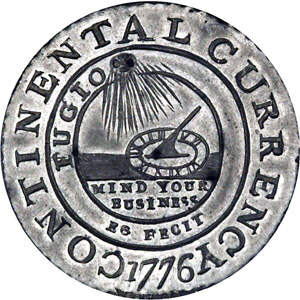
The first American coin, the Continental Dollar, was not emblazoned with the motto "In God We Trust." Nor E Pluribus Unum, the unofficial motto of the 13 original colonies, "One of many, One."
Treasurer Salmon P. Chase urged that "In God We Trust" be put on coinage during the Civil War to suggest that God was on the side of the Union, and it was added to our paper currency in 1956 after lobbying by The Fellowship, the group that created the National Prayer Breakfast.
The original coin was labeled with "Fugio," Latin for "to fly," and a sundial meaning Time Flies, and more importantly, three words long forgotten from our lexicon:
MIND YOUR BUSINESS.
Do we even know what that means anymore? Everyone's business is our business now. We watch reality shows, to discuss the petty peeves and peccadilloes of otherwise unaccomplished people. "Mind Your Business" was not a finger-wagging phrase to chide you for nosiness. It stated a simple fact: if you are overly concerned with your neighbors' business, you cannot adequately mind your own. The penny version, shown below, was designed by Benjamin Franklin, that coiner of aphorisms.
Other writers find me to be prolific. I consider myself rather lazy as a writer. I write one or two times a day, at lunch and after dinner, every day. Sometimes I only eke out 500 words, but I always write something. Where do I find the time? By minding my own business. I don't care if two women want to get married. Or if some guy wants to hoard guns. Or if a has-been movie star went on a self-destructive rant again. This is not my business. Oh, I have political opinions, and I vote religiously. But unless someone's basic human rights are being violated, I don't care what other people do. Some woman wants to have 30 children to serve the Lord? Go right ahead, I'll even pay taxes for their health care. A guy likes to rock climb and sucks at it, and we have to pay to put him in a cast every six months? Have fun, maybe you'll write 127 Hours 2: Another 48 Hours.
You want to make snarky comments about someone's lifestyle choices, cluck your tongues and shake your heads? By all means, have at it. But don't expect me to take you seriously.
Time flies; do your work.
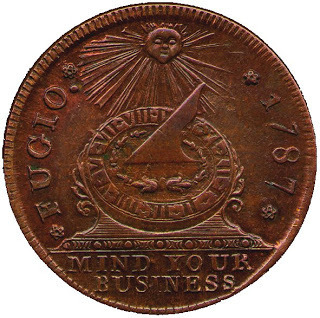
That's my two cents... or $1.01, actually. On another note, I collected coins as a kid, until my collection was stolen by movers. I never owned a real Continental coin, they range from thousands to hundreds of thousands. If I am ever shamefully rich, I will buy one of these and keep it in my pocket.
© 2012 Thomas Pluck
I post on Twitter as TommySalami ~ My Facebook Page

Published on May 10, 2012 06:25
May 9, 2012
Angola: The Farm

The Louisiana State Prison, nicknamed "Angola" after the plantation land it sits on, is unique, infamous and impressive all at once. They also call it "The Farm," because all prisoners work, and the farms on the grounds feed the inmates. Some have likened this to slavery, but a working man gets in less trouble, and Angola has over five thousand prisoners, a large percentage of which will never walk free again. Louisiana's sentencing guidelines are some of the toughest, and the prison has a hospice for all the elderly cons it must take care of. And not all are convicted of violent crimes.
Angola has a great variety of programs to keep the prisoners involved. There is the Angola Rodeo, which is as dangerous as any other, and garners criticism comparing it to the Roman gladiatorial arena. There is also a golf course for prison staff, where prisoners with the best behavior records can work as caddies, and recreational grounds and ball parks they can use as well. There are two programs for fathers in prison where they can meet with their families once a year.
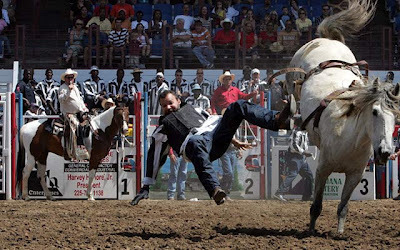
Angola Prison Rodeo
However, the last thing you'd say about Angola is that it coddles prisoners. The prison has a long history of violent abuse and it was only turned around in the last two decades. Sex slavery rings were common, the "Red Hat" cell block was a pit of inhuman misery, and the guards were among the lowest paid in the nation. It has turned around, and while at first glance this may look like a country club, when you watch these prisoners or read their articles in The Angolite, the prison magazine, you see they are different from most convicts in other prisons. They have some dignity. They are not marking time in a cell, they can see the fruits of their labor, whether they sport a silver rodeo belt buckle, harvest crops, or ease a fellow con's pain in the hospice. And according to the Shreveport Times, Angola has a lower rate of recidivism than local facilities, but this may not be correlated to these programs.
An excellent documentary on Angola and prison life in general is The Farm: Angola USA. The film documents the hospice, the rodeo, and the difficulties in housing a large prison population, many for life sentences. At least three of the prisoners featured were released after long legal fights over their convictions. Which is available to view on Liveleak:
Direct Links to: Part 1 | Part 2 | Part 3 | Part 4
I found out about The Angolite through my writer buddy and ex-con Les Edgerton, author of The Bitch, Just Like That, The Perfect Crime, Gumbo Ya-Ya and many more. Subscriptions are $20 a year, and having read my first issue of this slick and well-written magazine, it is quite a bargain. The July/August 2011 issue had an in-depth article on illicit cell phone use in prisons, plus articles on the "Long Termers," cons in Angola for 25 years or more, the Returning Hearts family visit program, plus short "expressions" and poetry by convicts, including a touching elegy to a lifer who'd rehabilitated himself yet died behind bars, an old trusty they called "Papa Smurf." It's great reading, and gives an insight into prison life.
Subscribe to the Angolite
© 2012 Thomas Pluck
I post on Twitter as @TommySalami ~ My Facebook Page

Published on May 09, 2012 06:33
May 8, 2012
The Nutley Brass
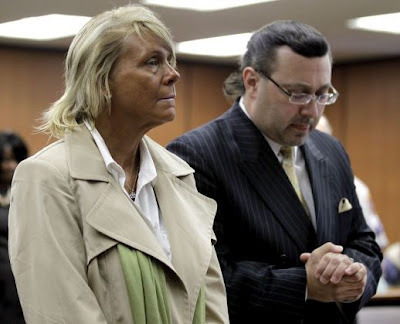
Even before the tanning mom, I was embarrassed to come from my hometown of Nutley- where Martha Stewart spring like a decorating demon in a puff of brimstone and potpourri- at least until the Nutley Brass covered the Ramones and the Misfits.
This came about at the height of the lounge resurgence, when everyone loved Esquivel and Richard Cheese was covering everything. I like what the Brass does better. They infuse their versions with an unironic glee. I wonder if they learned music from Mr. Kohere, like I did? From the sound of our band, he was a great music teacher, but I had him for Humanities, an advanced course that mixed art, history and literature. We learned music history, but all I remember is how pop singers were terrible because they need microphones, and abortion was wrong because you might abort Beethoven (The flip side to his logical fallacy, that you could also abort Hitler, was overlooked).
There's still plenty to be ashamed about in Nutley, like the whites-only swimming pool*, but the town always had its share of free spirits and iconoclasts. The area called "The Enclosure" was an artist colony in the 1800s, and is listed on the register of historic places. Today, it is just a bunch of expensive homes by Mill Pond (which everyone calls the Mud Hole). There was also Angelo Nardone's sculpture garden, a glorious eyesore of overgrown Roman sculpture, that the town fought for decades, tearing it down the moment its owner fell ill and was admitted to the VA hospital.
Nutley also stars in my novel, mostly as backdrop to one story arc where a kid from out of town moves in and faces off with a brutal bully. The Nutley Brass won't be making an appearance in this one, but I'll give them a homage someday when I make a character an aging band geek.
* Update: the swimming pool owners settled for $1 million, sold the pool and moved out of state. The current ownership does not discriminate.
© 2012 Thomas Pluck
I post on Twitter as TommySalami ~ My Facebook Page

Published on May 08, 2012 10:37
May 2, 2012
Spinetingler Awards
[image error]
No, not that Tingler!
First of all, congratulations to everyone who was nominated for a Spinetingler Award this year. The winners are listed here: Spinetingler Awards
I'm very proud to have a story, "Black-Eyed Susan," in the winner for Best Anthology, Beat to a Pulp: Hardboiled. Special thanks and congratulations to David Cranmer for editing the anthology, and calling me at the last minute when he needed a story.
It is 99 cents for Kindle; check out what the fuss is about.
© 2012 Thomas Pluck
I post on Twitter as TommySalami ~ My Facebook Page

No, not that Tingler!
First of all, congratulations to everyone who was nominated for a Spinetingler Award this year. The winners are listed here: Spinetingler Awards
I'm very proud to have a story, "Black-Eyed Susan," in the winner for Best Anthology, Beat to a Pulp: Hardboiled. Special thanks and congratulations to David Cranmer for editing the anthology, and calling me at the last minute when he needed a story.
It is 99 cents for Kindle; check out what the fuss is about.
© 2012 Thomas Pluck
I post on Twitter as TommySalami ~ My Facebook Page

Published on May 02, 2012 05:29
May 1, 2012
Crime Factory 10
This is how they do it down under...
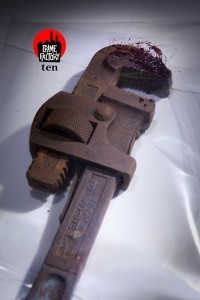
The Crime Factory issue #10 is out, with an interview with Megan Abbott, a deposition by Josh Stallings and my story "Lefty," about some goombahs on a fishing trip to the Louisiana bayou. It is available as a PDF from their website (Follow the Crime Factory link) and will soon be available for Kindle. I wish it was available in print, but they only do that for special issues like Kung Fu Factory. I wonder if Createspace could turn this PDF into a print on demand zine, or Lulu? I think it would be worth the trouble. So read it on your PC or your e-reader, it's free and they always get a great line-up of contributors!
© 2012 Thomas Pluck
I post on Twitter as TommySalami ~ My Facebook Page


The Crime Factory issue #10 is out, with an interview with Megan Abbott, a deposition by Josh Stallings and my story "Lefty," about some goombahs on a fishing trip to the Louisiana bayou. It is available as a PDF from their website (Follow the Crime Factory link) and will soon be available for Kindle. I wish it was available in print, but they only do that for special issues like Kung Fu Factory. I wonder if Createspace could turn this PDF into a print on demand zine, or Lulu? I think it would be worth the trouble. So read it on your PC or your e-reader, it's free and they always get a great line-up of contributors!
© 2012 Thomas Pluck
I post on Twitter as TommySalami ~ My Facebook Page

Published on May 01, 2012 05:55
April 30, 2012
Review: Every Shallow Cut

Every Shallow Cut by Tom Piccirilli
My rating: 5 of 5 stars
I have a confession to make. I don't like stories about writers. Or losers. Or writers who are losers. Well, that's not technically true, as most noir tales are about losers of some sort, and a few writer stories like Misery are interesting, mostly because of the crazed fan with a chainsaw. I am picky with the kind of loser story I like. If you are on a path of self-destruction, that's fine. If you are crushed by forces bigger than you, that's fine. If you're a schlub, I am not interested, 99% of the time.
Two books* in recent memory have been exception to this, and one of them is Every Shallow Cut, Tom Piccirilli's raw and unflinching tale of a man in a death spiral. A bullshit artist in a world of bullshitters clinging to a crumbling bullshit world, our nameless narrator was happy once, but built his house on the soft clay of imaginary dreams. The inevitable sinkhole has consumed his wife, his work and his life. He trades his last possessions for a gun in a pawn shop, and goes tracking the condescending villains of his personal tragedy, only to find they are as pathetic and devastated as he is. Every Shallow Cut is a subtle masterpiece that lays open the story of the man who's lost everything and goes looking for answers.
Highly recommended.
* (The other book is The Ask, by Sam Lipsyte).
View all my reviews

Published on April 30, 2012 10:29
April 27, 2012
We Were Intrepid, Once

I climbed onto the roof of my building today to watch the fly-by of the Space Shuttle Enterprise atop a 747, for its final air voyage before it becomes a museum piece on the deck of the USS Intrepid. I remember the sense of wonder, a tickle in the gut, when I watched the first space shuttle launch, the Columbia. I recall the emptiness when the Challenger exploded over the ocean. And worse, when we later learned it was avoidable, and that they burned up in the shuttle's slow death spiral into the sea.
So there is another sense of loss, seeing the iconic shuttle fly for the last time. I know the space program will go on, with the Orion vehicles. At least I hope it will. The shuttles were what a car maker calls a "halo vehicle," a money loser that drives other sales. The Dodge Viper never makes money, but those who can't afford it might buy a sporty, affordable car from Dodge. The shuttle may have struggled to remain relevant, but it looked like what our dreams expected when we thought of futuristic space travel, and that made us interested in what NASA was doing, even if the science was a little dubious. Like when John Glenn flew up there to test zero gravity's effects on an aged body. Hey, I was fine with the astronaut getting a freebie flight up there.
Will we watch the Orion launches with the same sense of wonder? I hope so. It's a rocket based system. Not as sexy. I hope it will be much safer for the astronauts, though. 2 missions out of 135 failed, with loss of life. The engineers said the design would have a 1 in 100 chance of failure, and sadly, it looks like their math was correct.
We tend to think of the space program as a luxury, but I think President Kennedy was correct about its importance. We must dream big. We should not abandon our fight for the stars. It is not a zero sum game. Every space launch does not leave a child unprotected. And while we wage war with impunity, we cannot point a finger of blame at the rocket taking humanity to Mars.
© 2012 Thomas Pluck
I post on Twitter as TommySalami ~ My Facebook Page

Published on April 27, 2012 12:12
Review: Paths of Life: Seven Scenarios

Paths of Life: Seven Scenarios by Alice Miller
My rating: 5 of 5 stars
There are few books that have succeeded in changing my way of thinking. One of them was The Confidence Course by Walter Anderson. This groundbreaking book exposes the breadth of child abuse in the world committed under the guise of discipline. "Man hands down inhumanity to man," wrote Philip Larkin. And psychoanalyst Alice Miller- who left the Psychiatrists association for their refusal to let go of Freud's abuser-forgiving "Oedipus Complex"- shows in stark detail how "every smack is a humiliation," and we force ourselves to think we deserved it, because the truth- that our beloved parents hit us out of frustration or anger- is too much to bear.
I was blessed with a good childhood. I was never spanked or slapped that I remember. However, I learned that one expresses his anger by shouting, frightening his loved ones, slamming doors and punching walls, from my alcoholic father. It's a behavior I struggle with. I avoid confrontations, because I am afraid of what my fists will do. When I was five, a playmate hit me in the head with a chunk of asphalt because he wanted the car I was playing with. My mother had to pull me off of him. Ever since then I have fought battles with temper. I've trained in MMA to have an outlet for it.
This short book will help you decode your own behavior, with a little introspection. And when you unravel it, you can begin to change it from the roots.
Its revelations are also stunning: not every abused child goes on to become a criminal, but every violent criminal studied has revealed a litany of abuses that "they deserved." And they take it out on the rest of us until the day they die. Miller does not absolve the violent of their behavior, but shows us how to reduce it in future generations. We have yet to listen.
View all my reviews

Published on April 27, 2012 06:49
Thomas Pluck's Blog
- Thomas Pluck's profile
- 122 followers
Thomas Pluck isn't a Goodreads Author
(yet),
but they
do have a blog,
so here are some recent posts imported from
their feed.



